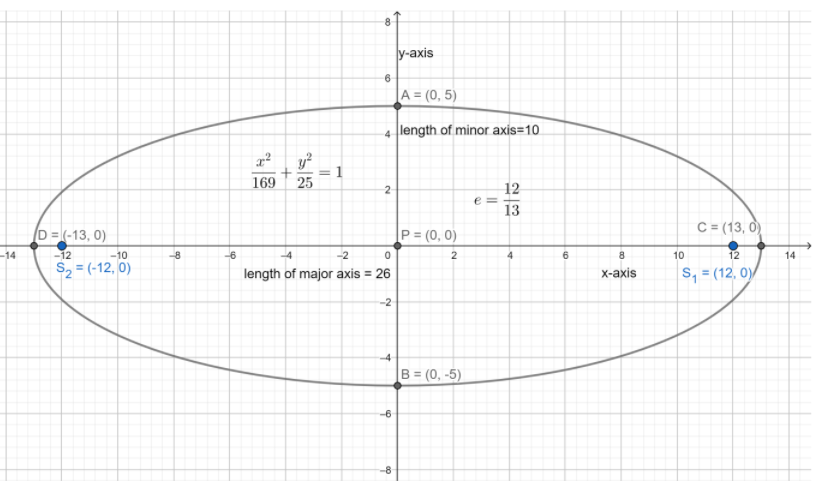Question
Question: How do you graph the ellipse \(\dfrac{{{x}^{2}}}{169}+\dfrac{{{y}^{2}}}{25}=1\) and find the center,...
How do you graph the ellipse 169x2+25y2=1 and find the center, the major and minor axis, vertices, foci and eccentricity?
Solution
In this we have been asked to draw the graph of the given ellipse 169x2+25y2=1 and find the center, the major and minor axis, vertices, foci and eccentricity. We know that the general equation of ellipse is given as a2x2+b2y2=1 where a>b then its center is located at (0,0) , the length of the major and minor axis is given as 2a and 2b respectively. Vertices on the major and minor axis are (±a,0) and (0,±b) . The eccentricity is given as e=1−a2b2 .
Complete step-by-step solution:
Now considering from the question we have been asked to draw the graph of the given ellipse 169x2+25y2=1 and find the center, the major and minor axis, vertices, foci and eccentricity.
From the basic concepts we know that the general equation of ellipse is given as a2x2+b2y2=1 where a>b then its center is located at (0,0) , the length of the major and minor axis is given as 2a and 2b respectively. Vertices on the major and minor axis are (±a,0) and (0,±b) . The eccentricity is given as e=1−a2b2 . The foci of an ellipse are given as (±ae,0)
Here the values are a=13,b=5 .
Hence the center is located at (0,0) . The vertices on the major and minor axis are (±13,0),(0,±5) respectively. The length of major and minor axis is 26,10 respectively. The eccentricity of the given ellipse is
⇒e=1−(13)2(5)2⇒e=132132−52⇒e=169169−25⇒e=169144⇒e=1312
The foci of the given ellipse are given as
(±(13×1312),0)⇒(±12,0) .
The graph of the given ellipse will look like:

Note: While answering questions of this type we should be careful with our concepts. We should carefully mark the points on the graph and join them for getting an accurate one. Someone can make mistake during calculation and write the value of eccentricity as ⇒e=1−(13)2(5)2⇒e=169169−25⇒e=169121⇒e=1311
which will lead us to end up having a wrong conclusion.
